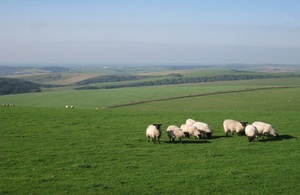The RPA delivers strong performance across 2021
The Rural Payment Agency looks back on 2021

The Rural Payments Agency has paid out just under 101,300 eligible claims, totalling £1.8bn for farmers in the first month of the payment window which runs between December and June.
This total represents 98.3% of eligible claims to the Basic Payment Scheme (BPS), 62.2% of claims to the Countryside Stewardship Scheme (CS) revenue and 64.6% of claims to the Environmental Stewardship Scheme (ES) 2021.
In addition, across 2021, £66.75m was paid out in Countryside Stewardship Capital Grants which support the establishment and maintenance of woodland and hedges. Just under 5,700 CS Capital claims were paid out within an average of 30 working days.
Through Countryside Stewardship, farmers can apply for funding to improve their local environment – from restoring wildlife habitats and creating woodlands to managing flood risk. Following close working with industry, changes have been made to the scheme this year to broaden out the options available and make it easier to apply.
Following these measures to simplify the scheme, the RPA received a 40% increase in applications for Countryside Stewardship, in comparison to 2020.
There are now over 40,000 farmers in England participating in either Countryside Stewardship or legacy Higher Level Stewardship (HLS) schemes. HLS is an Environmental Stewardship agreement for more complex types of management and agreements tailored to local circumstances.
RPA Chief Executive, Paul Caldwell, said:
We have continued to improve our service helping farmers deliver the best outcomes they can and we’ve worked hard to get payments made as quickly as possible – and will continue to do so.
I understand how important it is to help farmers through the transition period, to help them secure their future and our key focus is to help everyone make the most of the opportunities from the Agricultural Transition Plan. I am proud of what we have achieved in 2021 and we are focused on delivering more great results for our farmers in 2022.
Across 2021 the RPA continued to play a crucial role in developing and delivering the Government’s objectives set out in the Agricultural Transition Plan. Building on the progress made in 2020, the Agency worked closely with Defra as the delivery body for the environmental land management schemes and saw the launch of the Sustainable Farming Incentive (SFI) pilot with over 2,500 expressions of interest and over 900 applicants.
The RPA delivered a number of other schemes and support in 2021:
- The agency opened up the window for 2022 Countryside Stewardship Agreements to allow farmers to apply for funding to improve their local environment from restoring wildlife habitats and creating woodlands to managing flood risk. Working closely with farmers and land managers changes were made to the scheme this year to expand the options available and make it easier to apply.
- The Agency saw an improved interest for the new Capital Grants scheme for 2021 with over 3,000 applications received to improve Air Quality, Water Quality, Boundary Trees and Orchards or a mixture of these options.
- The Countryside Productivity Small Grants Scheme provided investment towards specific items of equipment which improve productivity and efficiency for farming and horticultural businesses released £16m payments on just over 2,800 eligible claims.
- In December the RPA launched the initial Farming Investment Fund, including the Farming Equipment and Technology Fund and the Water Management theme of the Farming Transformation Fund. Farmers will benefit from a £27 million pot to invest in productivity-boosting equipment.
- The RPA opened a sixth round of the popular Countryside Stewardship Facilitation Fund in December 2021. The £2.5 million fund encourages collaboration and knowledge-sharing amongst the farming community to protect and enhance their local environment, in line with their local Countryside Stewardship priorities.
- The Government announced a package of measures to support the pig industry, seeking to reduce the animal welfare implications of pigs backing up on farms. The RPA launched the Slaughter Incentive Payment Scheme (SIPS) aiming to increase the throughput of pigs by contributing towards the extra costs involved in operating additional slaughter shifts at abattoirs and a Private Storage Aid (PSA) scheme to contribute towards the costs of cold storage of the product.
The RPA attended shows and events across the country providing regular progress updates and heard first-hand about farmers experiences which has helped improve future services. The RPA also hosted several regional Roundtables with English Members of Parliament and their constituents as it continued to learn, engage and focus on delivering the schemes and supporting agricultural and rural communities to navigate the changes over the coming months.